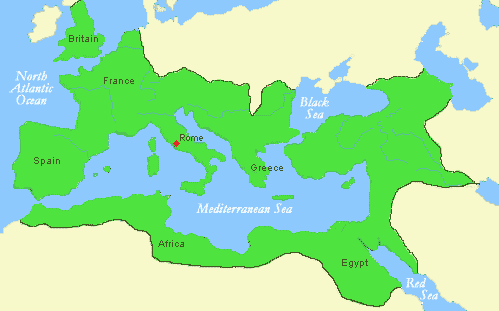Ancient Rome History
The early people of Rome were from a tribe called Latins. They were from the Plains of Latium. The Latins were successful farmers and traders and they became rich and successful. Therefore, Rome from its early days was a rich city. No one knows how or when Rome was founded. One legend says that the Trojan warrior Aeneas set up a kingdom in Italy after the fall of Troy in 1100 BC. Another legend tell us that the city of Rome was founded by Romulus in 753 BC, and that early on he murdered his brother Remus for ridiculing his pomerium, or the sacred boundary of the city he had founded.
This city was named Rome after its legendary founder, and we have a suitably heroic beginning for a city that would one day rule the entire Western world. Writers of later eras, including many Romans, would infer quite a bit from the part of the story where Romulus murders his brother, and say that as Rome was founded in an act of bloodshed, so the shedding of blood would become part of the Roman legacy. During the 500's BC, the Etruscans ruled Rome.
The Romans rose against the harsh Etruscan King Tarquinius Superbus, and declared Rome a Republic in 509 BC. The Roman Senate, which had originated as an advisory body to the monarch, decreed that Rome should have no more kings. The Roman republic, founded, according to tradition, in 509 BC, had an aristocratic form of government. It was headed by the Senate and by magistrates, later called Consuls-usually two in number-who were elected annually by the Senate.
- The Rape of Lucretia
- Establishing The Republic - Part 1
- Establishing The Republic -Part 2
- Republican Rome
- Lucius Junius Brutus - The legendary founder of the Roman Republic.
- The Consuls & Tribunes
- Expansion of Roman Republic The Gracchi
- Gracchi & Their Reforms
- The Gracchi & The Democratic Party
- Pergamun - The Jugurthine War (118-104 BC)
- The Cimbri & Teutones
- The Social War (90-88 AD)
- Mithridatic War
- Marius & Sulla
- Sulla and Marius Consuls
- Marius & Roman Military Organization In The Late Republic
- Sertorius, Lucullus, Pompey & Crassus
- War in the East
- In the Absence of Pompey
- Conspiracy of Catiline
- The Rise of Caesar
- Julius Caesar
- The First Triumvirate
- Caesar's Campaigns in Gaul
- Clodius & Milo - Death of Crassus
- Caesar & Pompey
- Civil War
- Caesar's Campaigns in Egypt, Asia, Africa & Spain
- Assassination Of Caesar
- The Second Triumvirate
- The Last Decade of the Republic
- Aftermath of Caeser's Death - Part 1
- Aftermath of Caeser's Death - Part 2
- The End of the Roman Republic
- Ideology, Identity and Empire -- The Romans
- Roman Revolution and Civil Wars

The Roman Empire in 120 AD
By 31, Octavian had defeated Antony and had successfully established himself as princeps, or first citizen. The Senate conferred numerous honors upon him, among them the military command (imperium), hence the modern term emperor. The republic was dead.
Octavian established a system of government called the principate that endured for two centuries. The principate, "rule by the first citizen", was a monarchy disguised as a republic. The princeps (the emperor) ostensibly ruled by commission from the Senate and the people. There was no automatic system of succession. Normally an emperor succeeded to the throne by virtue of connection--by blood, adoption, or affinity-with a predecessor, or one could seize power by force and inaugurate a new dynasty.
- Octavian and Antony: The Rise of Augustus
- Augustus & the Founding of the Empire
- Augustus
- About Augustus (Octavian) - First Roman Emperor
- Augustus Caesar and the Pax Romana
- The Augustan Age
- Expansion of the Roman Empire
- Rome at its Height
- Map of the Roman Empire
- Summarize maps of the Roman Empire
- Emperors of Rome
- Celts Against the Empire
- Period of Military Despotism
- Rome from Golden Age to Political Chaos
- Invasions & Distribution of the Barbarians
- Division of the Empire
- Map of the Division of the Empire
- The Fall of the Roman Empire
- The Eastern Roman Empire
- The Roman Empire After the Fall of Rome
- The Byzantine Empire
- Byzantine Civilization
- The Conversion of Constantine
- The Founding of Constantinople
- Fourth Century - Christianity & Paganism
- The Justinian Code
- The Ostrogoths
- A Chronology of the Early Byzantine World
- Emperors of the Byzantine Empire
- Christian Emperors & the Fall of Rome
- Survival of the Byzantine Empire
- Remnants of the Roman Empire
- History
- Geography
- Maps of Roman Britain
- The Ravenna Cosmography - list of all the towns and road-stations in Britain throughout the Roman Empire
- People of Roman Britain
- The Celtic Tribes of Britain
- The Legions
- Wales and Resistance
- Boudica
- Carausius
- Hadrian's Wall
- Antonine Wall
- D. Clodius Albinus
- The Gods & Goddesses of Roman Britain
- Roman Ruins in Britain
- Roman Towns and Settlements in Britain
- Roman History - by Richard Hooker
- Mosaic : Perspective on Western Civilization
- A Biblical Interpretation of World History - Ancient Rome
- Larth the Etruscan - Follow Larth the Etruscan on a fascinating journey through the history and places of his homeland.
- Byzantine Glory
- The Barbarians
